Paleophilia
I suppose this love affair with museums comes from somewhere. I'm not entirely sure what that wellspring is, though, as I don't recall many museums in my childhood. We did a lot of vacations to very remote areas - which I also love! - but virtually none into cities where you could find such refinements of civilization as shrines to artifacts of the past could be found easily. Perhaps that is it, the deprivation of something I knew existed, could read about in books, but couldn't reach. I don't blame Mom. This past weekend (long weekend, four days in Washington DC trying to fit in as many sites as we could see) doing the city with a fourteen year-old in tow was challenging enough, doing it with multiple small children, one of whom was profoundly handicapped, would be beyond me, too.
I did learn something else about myself. I'm not a fan of the 'interactive' style of museums. It's not that I don't like hands-on learning. I do. And there is nothing like really getting your hands into the past, as I have been able to do through Dad being involved in re-enacting as I spun, wove, hand-sewed, and more. I have also lived in, shall we say, primitive conditions that were straight out of the history books in some ways. But the silly little 'press this button' exhibits in museums leave me cold. That, and as my brother-in-law so accurately pointed out while we were trying to explore the Spy Museum (more on that later this week, much more) those types of exhibits are usually mobbed by the kids. Which is great! For kids, those are awesome. For adults, or at least me? I want to be able to look at the artifacts. I want to have a detailed description, perhaps enough to set this thing, made by hands long turned to dust, in the timeline of the world. I love to be able to see the stitches, or the brushstrokes, or the carvings someone once worked hard to create, having no idea of the enduring mark they made on the world.
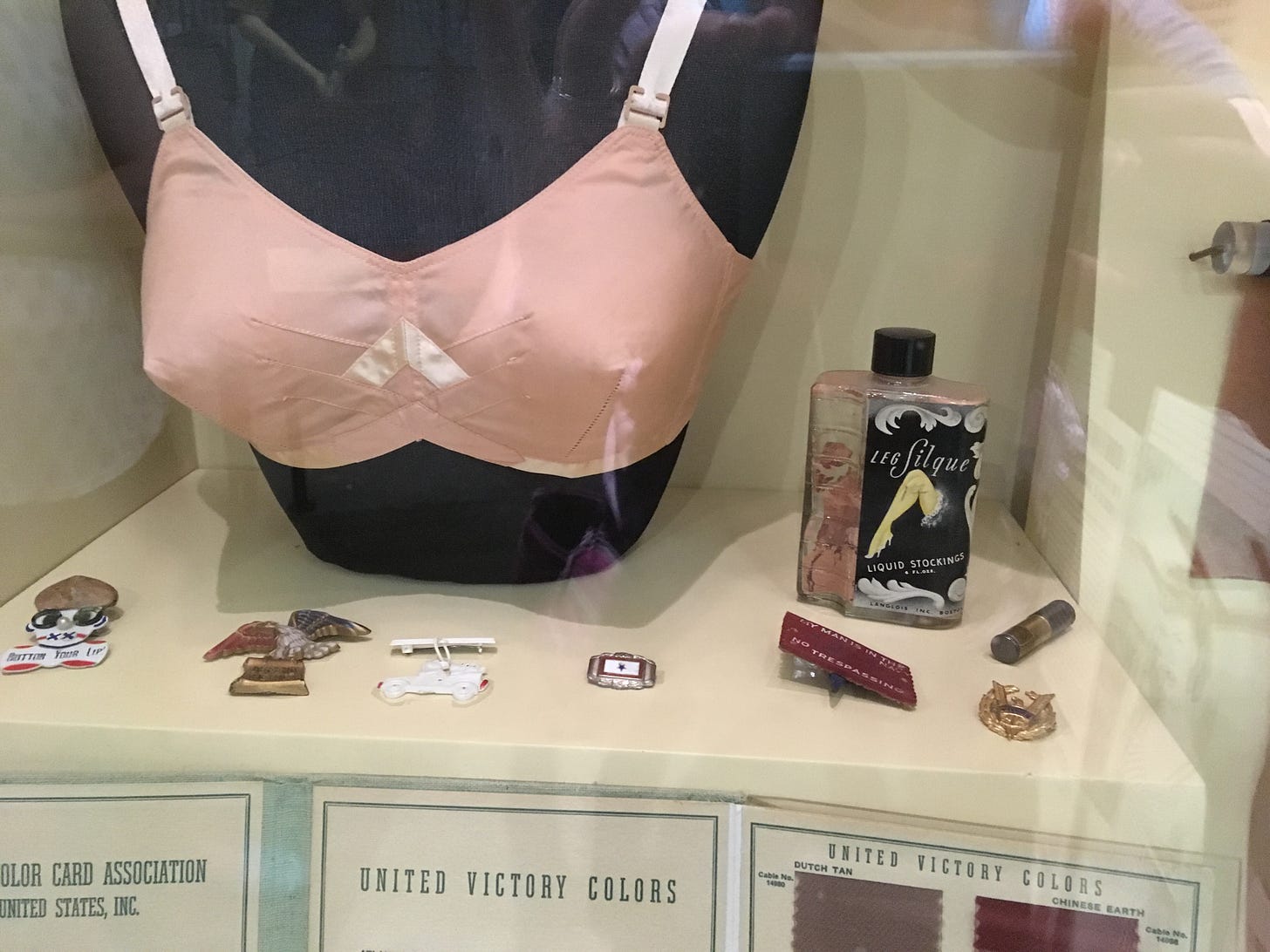
Sometimes it's the slightly absurd things that were left behind, which remind us of what was important then to the common... woman. Stockings and underwear were a must!
Art museums are different than history museums. In the art world I am usually looking for the sublime, the polished work of the Masters, the spark of divine creativity brought to life by the human hands. I'm not there to see the sloppy 'modern art' that is lacking in any sign of effort or skill other than that of the con man spinning a skillful tale to extract monies from someone. History, though... in the history exhibits I want to see the mundane, the pedestrian, the momentoes of daily life that were taken for granted but speak so loudly of what it was to live in that time.
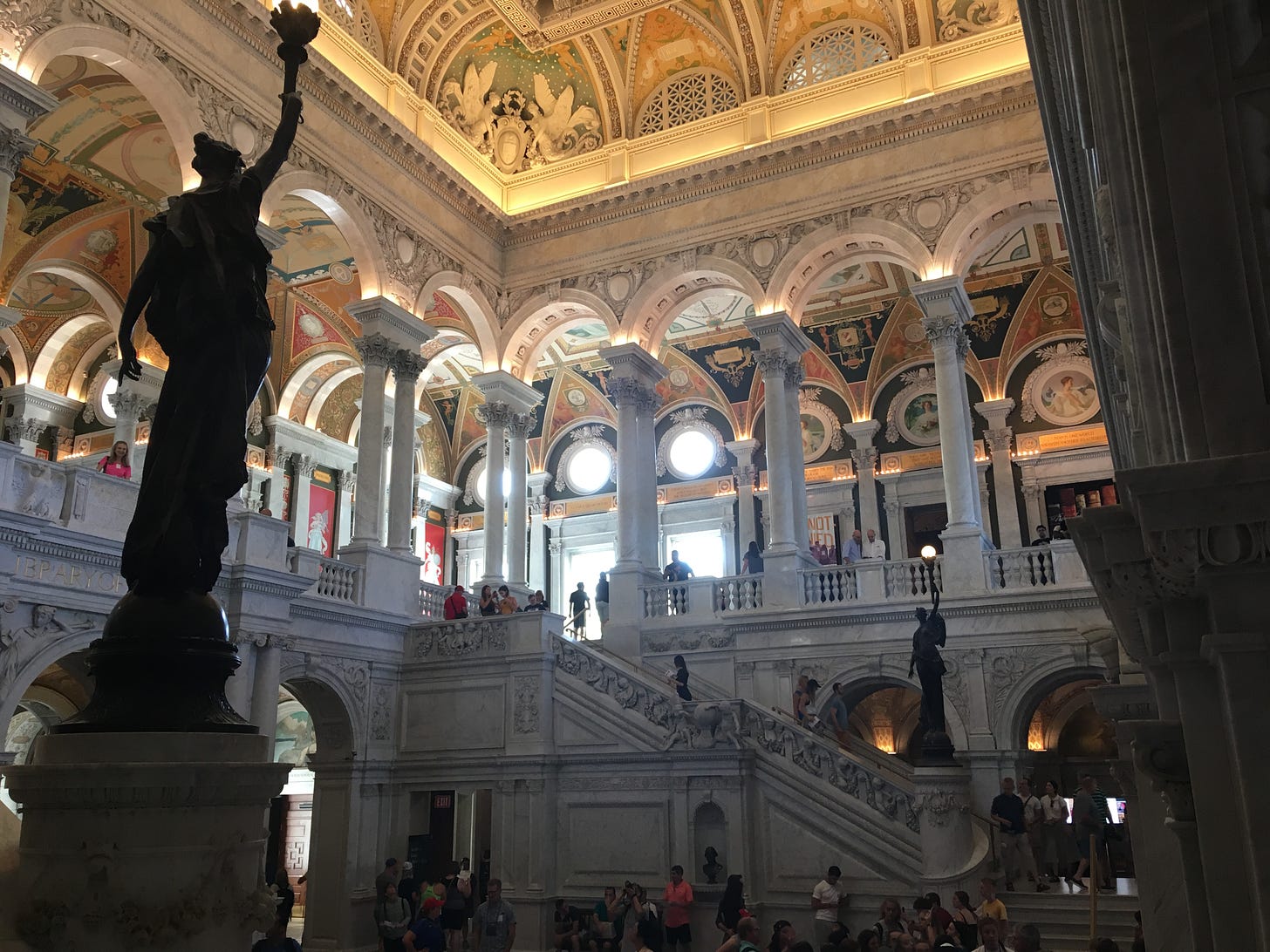
The sublime was always meant to inspire, to lift up the pedestrian heart and aspire to greater things.
I can stand here, looking forward to what the future brings, the world my children and grandchildren may inhabit. As a writer of science fiction, I revel in futures. As a paleophile, I am acutely aware of how the future we live in compares to the past we came from. By knowing what it took to make that dress hanging under cold lights in a climate-controlled museum, I know how much I appreciate my recent shopping trip to buy a suit that fit me, looked great, and cost relatively little in comparison to this dress suited for high class society. Further, because I know more about sumptuary laws than most, I really appreciate that I do not need to belong to that wealthy privileged caste to be allowed to wear any color I want. I can dress in a rainbow, and all I will get are compliments, not a fine and legal consequences.
Letters also fascinate me. It's not just the elegant script of a long-gone generation who were taught how to write, really write. It's the slow speed of communication these letters speak of. The months or weeks from sending, to receiving. And then more time passes before a response came. Patience is only one emotion these pieces of ink-stained paper contain. If you have a chance, find a museum near you with letters you can read. People are people, I think you will find a spark of connection that leaps across the years and draws you into a life far from now.
Perhaps most of what I love about museums is that connection. Reminders that it was real, and real people endured the marks of history's milestones. The pain, the cruelty, but also the joys and triumphs that come with the passage of time. It sounds trite, to say 'lest we forget' but it's really not. It is crucial, especially now, in this time when we are overwhelmed with the constant clamor of 'NOW!' to pause and reflect on what the world was like before us. How did we get here, what factors influenced the stream of history and led us to the place where we stand facing uncertain futures? Pretending the past was not there, whitewashing history, denying men have grown from the bad times and learned how better to be human... that's not helpful. It's relatively unimportant, when you think of it on a Global scale, but the recent kerfluffle over the Cambpell Award and the unpersoning of the man who paved the way for the success of the, ah, person who when they were receiving the award, spat all over the origins of it... that is a perfect example of what happens when we forget history. What will come of us if we deliberately turn away from our museums, because the artifacts in them, the hands that shaped them, become 'problematic'? We will forget. Then, we will make the same mistakes those who want to erase history want to pretend never happened.
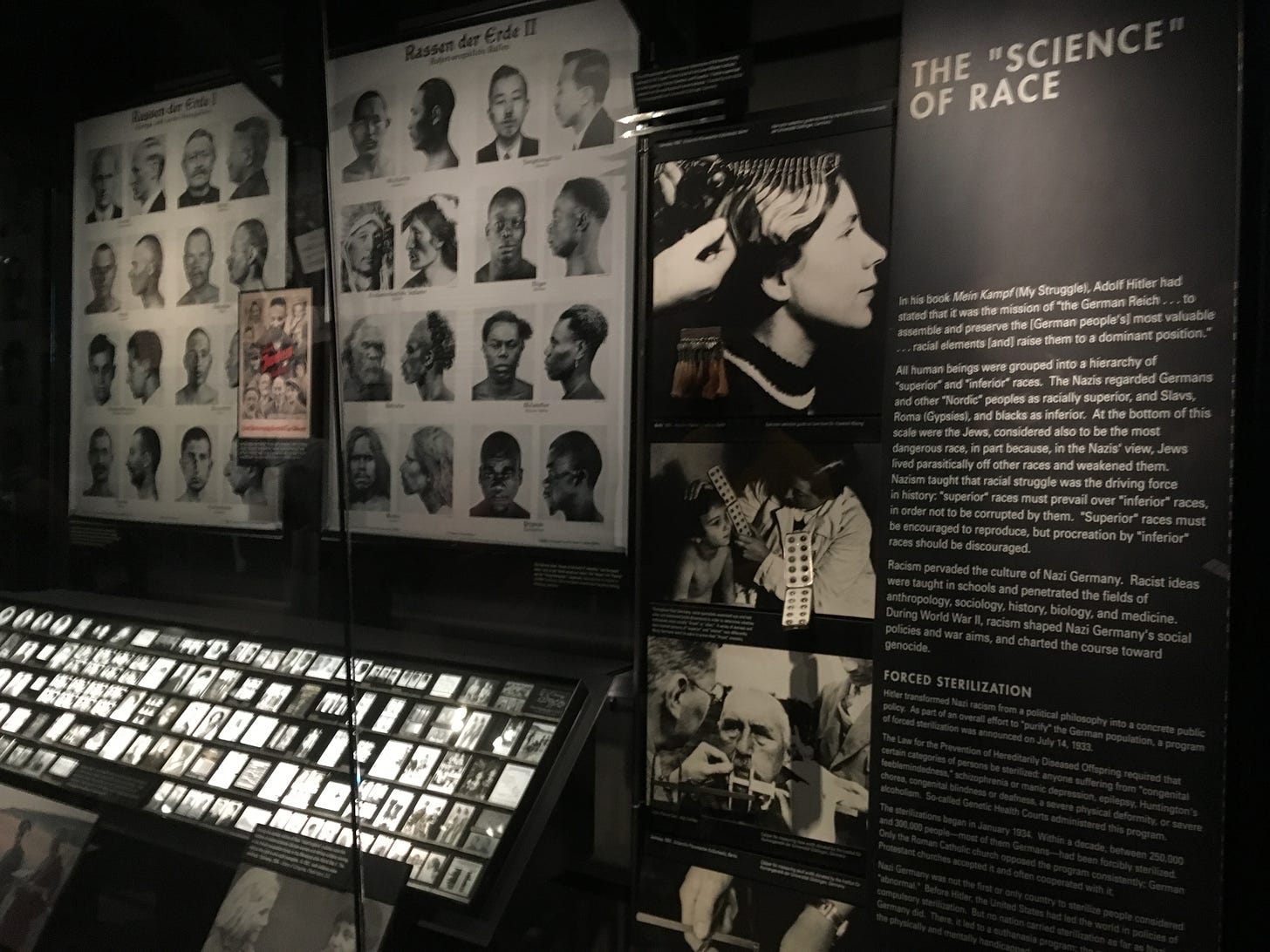
Records of horror speak to our hearts, and we grieve. But we take the lessons and declare 'never again.'
We learn not only from our own mistakes, we learn from other's lessons, too. I was privileged to walk through the Holocaust Museum during this trip. It was busy, full of people (but not crowded), and yet it was hushed. In the face of such vivid horror, I couldn't help but think that this museum exists because it was recorded. The Germans had no intention of forgetting what they were doing. They kept impeccable records, and this museum would not exist had they not done so. If they had followed through with the inhumanity, and unpersoned the Jews so far as to obliterate all mention of them and what was done? We would be in the place of those who futilely seek to illuminate the Holodomor, the genocide in Rwanda, the horror that was Armenia a century ago. Remembering the evil that man is capable of is essential to ensuring it does not happen again. Sweeping it under the rug leaves you with a lumpy floor and everyone pretending that didn't happen, or worse, saying 'it wasn't that bad'.
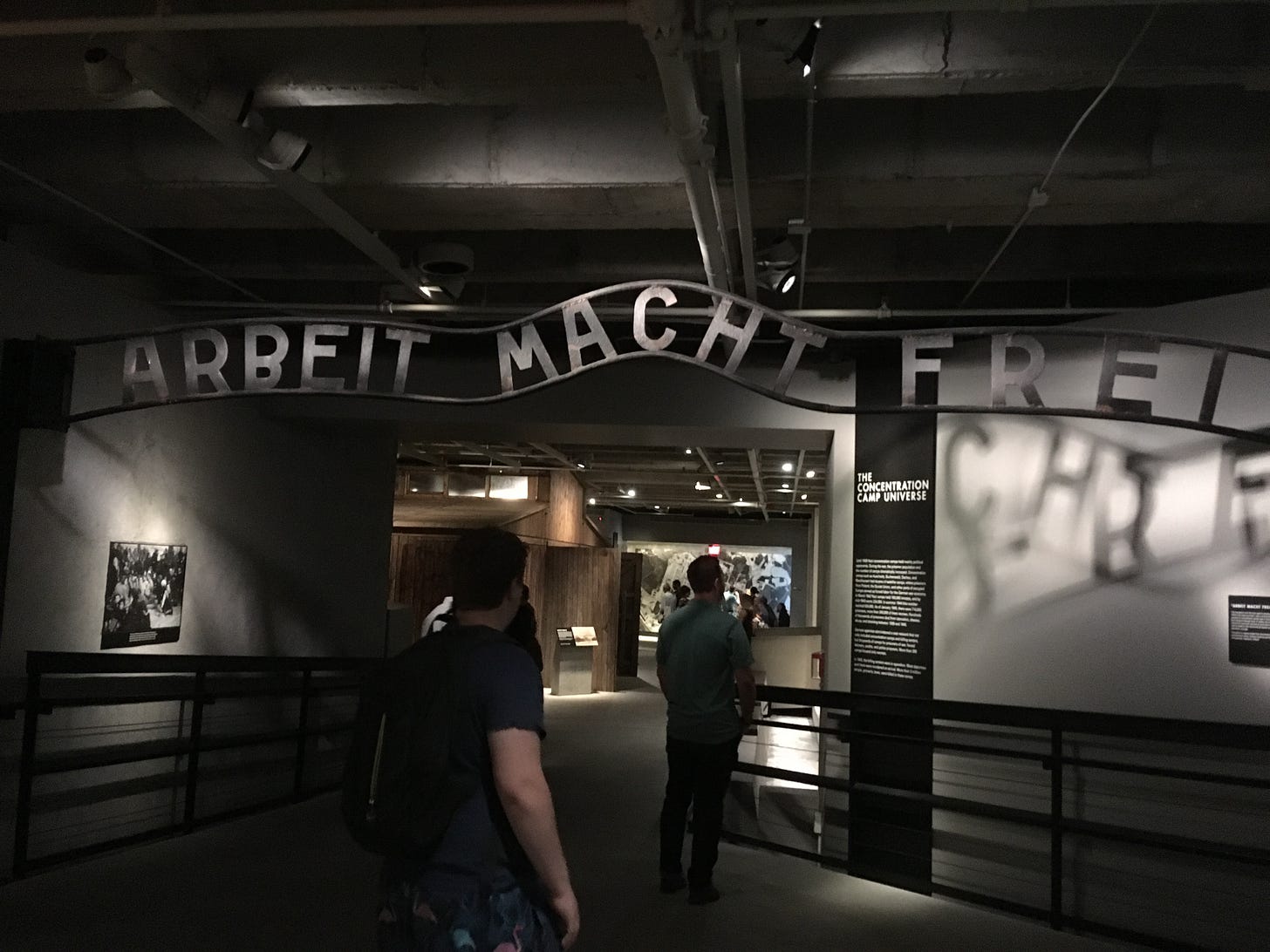
We must never forget.
We all came from history. Embrace it, warts and all. You are a child of your ancestors, even when they embarrass you. But if you know history, you can shape the futures with what you learned, so you don't have their warts. You have your own warts. your children will have their unique flaws, too. No-one is perfect. Everyone contributes to history, for better or for worse. Without Campbell, we wouldn't have had that award that no longer exists. Which would mean that many authors over the years - including the one who did her best to hawk the nastiest lougie she could on his legacy - would not have had the place to stand and speak. She did, she used it to tear him down, ironic in that she would never have risen to that point without the award. Someone asked me, when I commented that it was a terrible thing to do 'well, he would never have given her that award.' He might not have. You see, Campbell cared about good stories, encouraging new writers, and making some money. Something makes me thing that a no-talent politically motivated hack would not have been high in his esteem.
So I'll keep trekking to museums and dragging my kids along. I don't tell them what to think when they are faced with the depths and heights of human accomplishment. I just present them with as much information as I can possibly find, and let them compile the facts into beliefs, and develop a philosophy that I hope will include paleophilia. Not that they want to return to the past, and repeat it. But that they can go forward into their futures, stronger for knowing where they came from. Molded by it, but not a perfect reproduction of it.
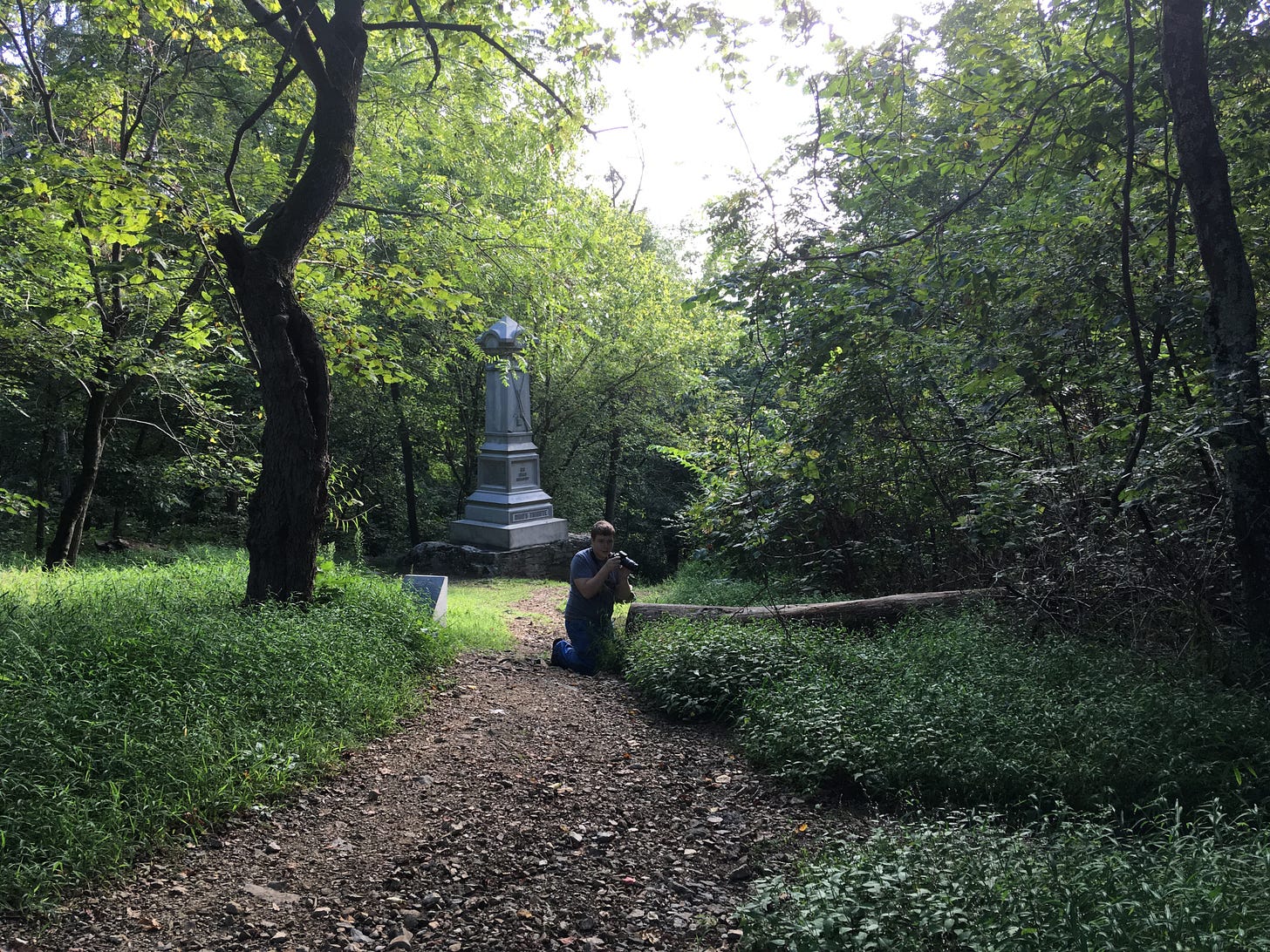
My son taking photos of flowers, in the shadow of a Civil War monument.




